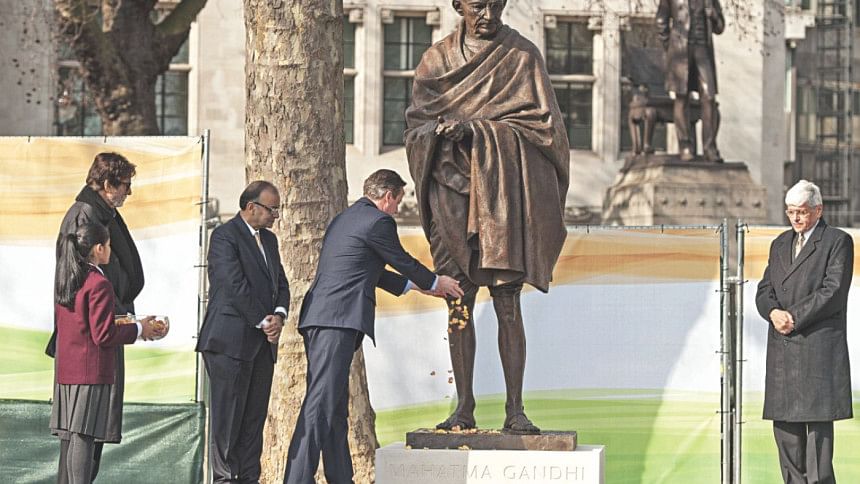Gandhi's statue unveiled at London's Parliament Square

Mahatma Gandhi's statue was unveiled at London's Parliament Square. Finance minister Arun Jaitley and actor Amitabh Bachchan were present alongside British Prime Minister David Cameron.
The prestigious Parliament Square is a space packed with monuments to men who defended the British empire which Gandhi helped destroy.
Jaitley, Bachchan and Cameron paid tributes to Gandhiji during the ceremony.
In an ironic twist, Gandhi's likeness will sit close to that of Britain's former wartime leader Winston Churchill, a man who strained to thwart Indian independence and who despised Gandhi and everything he stood for.
Churchill famously called Gandhi "a seditious Middle Temple lawyer, now posing as a fakir of a type well known in the East, striding half-naked up the steps of the viceregal palace."
But almost seven decades after India won independence from Britain in 1947, in large part thanks to Gandhi's peaceful civil disobedience campaign, relations between the two countries are strong with both nations keen to boost economic ties.
UK Prime Minister David Cameron and finance minister Arun Jaitley unveiled the statue, opposite the British parliament, to mark the 100th anniversary of Gandhi's return to India from South Africa to start the struggle for self rule.
"It also marks an important, historic moment celebrating the strong bond between our two nations," Jaitley said in a statement before the unveiling.
"India and the UK share the same values and we are a partnership of equals. This lasting friendship is just one of many legacies left by Gandhi."
British culture secretary Sajid Javid said his country's relations with India were those that Gandhi dreamed of - as friends and equals.
The bronze statue of Gandhi was crafted by British sculptor Philip Jackson and is based on a number of photographs and in particular one of Gandhi standing outside the London offices of the British prime minister in 1931.
The statue will be lower than others on the famous square, a deliberate decision made by the Gandhi Statue Memorial Trust to reflect the fact that Gandhi considered himself a man of the people.
The idea, the trust says, was that the statue would be among visitors to Parliament Square. The square also includes statues of former US President Abraham Lincoln and South African President Nelson Mandela.

 For all latest news, follow The Daily Star's Google News channel.
For all latest news, follow The Daily Star's Google News channel. 



Comments